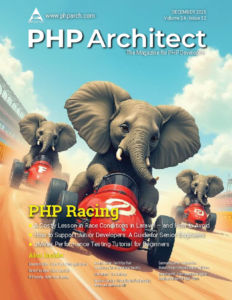Posts marked with “php”
Security Corner: Crossing the Streams
While not commonly seen in the wild, PHP exposes powerful interfaces empowering applications to manipulate large streams of data directly. Both stream wrappers and filters allow developers to interact with objects too large to fit in memory or which might be ephemeral in nature. Combining these stream interfaces opens up even more possibilities for the […]
Puphpeteer, 25 Years of PHP, and Joe Ferguson
In Episode 24 Eric, John, and Oscar discuss some of the articles in the September 2019 issue “Master of Puppets”. Topics History of PHP, celebrating “25 Years of PHP”, and the Impact Awards at php[world] Using Puphpeteer to automate Chromium browser tasks and testing. Code style, and refactoring legacy code. Code editors from VIM (and […]
The Workshop: Introduction to PDF Generation
Despite the promise of a “paperless” office, we still need to create documents that print and render nearly-identically across devices and operating systems. PDFs have filled this niche nicely for end-users, but if you need to generate PDFs with PHP programmatically, the options are overwhelming. How do you choose? In this series, we’ll investigate the solutions at our disposal and the pros and cons of each.
finally{}: 25 Years of PHP
PHP was released in the fall of 1994, making 2019 the 25th anniversary of PHP! We’ve certainly come a long way from the early days of the web. I’m not sure how many people reading this were around back then, but I was. Things were not pretty back then.
Internal Apparatus: Generated Singletons
This month we study the Singleton Design Pattern, but with a twist. We start with a correct implementation but get it wrong by refactoring. We’ll examine the PHP generated code, each step of the way, to understand what went wrong. We’ll observe at least two reasons the Singleton Design Pattern is now considered an anti-pattern. We’re preparing to learn useful variations next month by seeing precisely how it works under the hood.
finally{}: Semver, PHP and WordPress
Recently there was a big announcement that with WordPress 5.2, that they would be updating the minimum required version of PHP to 5.6. That’s a huge deal, but as can be expected, a vocal minority of the PHP community immediately erupted in anger
Internal Apparatus: A Walk Through the Generated Code
The PHP compiler/interpreter reads through our PHP code and produces an intermediate form. PHP’s virtual machine then interprets this intermediate form. PHP’s “generated code” feature allows us to walk through this intermediate form, better understanding exactly what PHP does with the software we write. We’ll begin with a three line example, observing the generated-code changes […]
Internal Apparatus: Memoization
Memoization is another form of memory use. I see it regularly used for improving application performance, but it’s also used to improve compiler performance. To learn the concept, we’ll use a PHP project with database tables, then look at other ways to use the technique.
Education Station: Data Structures, Part Two
Last month I talked about how, despite PHP arrays being one of the nicest things about the language, there were times where real data structures could help. There were various ways to use arrays as more “traditional” data structures, as well as the options provided by the Standard PHP Library, or SPL. If you can […]



![php[podcast] Episode 24](/wp-content/uploads/2019/09/episode-24-featured-160x84.jpg)





![php[podcast] logo on a drawing of a lion.](/wp-content/uploads/2019/06/episode-20-data-structures-160x84.jpg)





